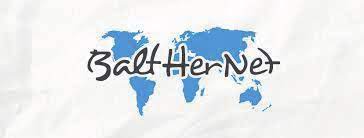
 The non-profit association Baltic Heritage Network (BaltHerNet) was founded in Tartu, Estonia, on January 11, 2008 to foster cooperation between national and private archives, museums, libraries, institutions of research, public associations and organizations collecting and studying the cultural heritage of the Baltic diaspora.
The non-profit association Baltic Heritage Network (BaltHerNet) was founded in Tartu, Estonia, on January 11, 2008 to foster cooperation between national and private archives, museums, libraries, institutions of research, public associations and organizations collecting and studying the cultural heritage of the Baltic diaspora.
It aims to facilitate the preservation and research of the historically valuable cultural property of the Baltic diaspora, as well as to ensure accessibility of these materials to the public. BaltHerNet is also committed to the organizing of conferences, seminars and workshops, and to developing and administrating the electronic information website Baltic Heritage Network, a multilingual electronic gateway for information on the cultural heritage of the Baltic diaspora.
The summer edition of the Baltic Heritage Network quarterly newsletter describes an annual event for diaspora researchers at the Martynas Mažvydas National Library of Lithuania. This year, the Lithuanian Studies Section of the National Library of Lithuania organized the 8th annual seminar for scholars and researchers in diaspora studies.
At the beginning of the seminar, Dr. Dalia Cidzikaitė, senior Lithuanian Studies researcher, recalled that the idea of organizing interdisciplinary seminars for Lithuanian diaspora researchers arose about a decade ago when the National Library of Lithuania hosted an international seminar of the Baltic Heritage Network. Dr. Jolanta Budriūnienė, Director of the Documentary Heritage Research Department of the National Library stressed that the common denominator of such seminars is the Lithuanian diaspora, and that these events provide an opportunity to share news about ongoing research across the field.
The first part of the seminar was dominated by topics related to arts and culture. Musicologist Dr. Aušra Strazdaitė-Ziberkienė discussed the issues of researching the exhibits of Mikas Petrauskas, a composer who also lived in the USA and the author of the first Lithuanian opera Birutė, which are kept in the M. and K. Petrauskas section of Kaunas City Museum. Musicologist Dr. Darius Kučinskas shared his experiences from his trips to the USA and talked about the specifics of working in Lithuanian archives there.
Literary scholar Dr. Akvilė Šimėnienė examined the intellectual friendship between diplomat and translator Povilas Gaučys and Spanish literary scholar Birutė Ciplijauskaitė, both American-Lithuanian emigrants. She also shared her thoughts about working in archives in the USA. Dr. Giedrė Milerytė-Japertienė, a historian at the National Museum of Lithuania, gave a lively report on a major exhibition on the history of migration that is being prepared, focusing on her recent expedition to South America. Later in the seminar, historian Dr. Viktoras Bilotas discussed the latest research on Lithuanians in Siberia.
Political scientist Ieva Padolskytė, the youngest participant at the seminar, discussed the return migration of the second generation of South American Lithuanians to Soviet Lithuania and the problem of national identification in their life stories. Historian Dr. Ina Ėmužienė gave a brief presentation on Soviet Lithuanian communication with the Lithuanian diaspora in North America.
Juozapas Blažiūnas, head of the Lithuanian Archives of Literature and Art, presented the material received from abroad by the Archives in 2022 and the work planned for 2023. At the very end of the seminar, Dr. Cidzikaitė told the story of Magdelana Raškevičiūtė-Eggleston, a Canadian-Lithuanian writer, and her first literary work, autobiographical novel Mountain Shadows, published in 1955. The presentation of a book about theatre and cinema director and actor Juozas Vaičkus, who left an imprint on Lithuanian as well as American theatre and cinema stage, written by Aušra Martišiūtė-Linartienė (Vilnius: Institute of Lithuanian Literature and Folklore, 2022) concluded the seminar.



























